Short Fiction by Arthur Machen (ebook reader .txt) 📕

- Author: Arthur Machen
Book online «Short Fiction by Arthur Machen (ebook reader .txt) 📕». Author Arthur Machen
“But your property, Herbert? You had land in Dorset.”
“I sold it all; the fields and woods, the dear old house—everything.”
“And the money?”
“She took it all from me.”
“And then left you?”
“Yes; she disappeared one night. I don’t know where she went, but I am sure if I saw her again it would kill me. The rest of my story is of no interest; sordid misery, that is all. You may think, Villiers, that I have exaggerated and talked for effect; but I have not told you half. I could tell you certain things which would convince you, but you would never know a happy day again. You would pass the rest of your life, as I pass mine, a haunted man, a man who has seen hell.”
Villiers took the unfortunate man to his rooms, and gave him a meal. Herbert could eat little, and scarcely touched the glass of wine set before him. He sat moody and silent by the fire, and seemed relieved when Villiers sent him away with a small present of money.
“By the way, Herbert,” said Villiers, as they parted at the door, “what was your wife’s name? You said Helen, I think? Helen what?”
“The name she passed under when I met her was Helen Vaughan, but what her real name was I can’t say. I don’t think she had a name. No, no, not in that sense. Only human beings have names, Villiers; I can’t say any more. Goodbye; yes, I will not fail to call if I see any way in which you can help me. Good night.”
The man went out into the bitter night, and Villiers returned to his fireside. There was something about Herbert which shocked him inexpressibly; not his poor rags nor the marks which poverty had set upon his face, but rather an indefinite terror which hung about him like a mist. He had acknowledged that he himself was not devoid of blame; the woman, he had avowed, had corrupted him body and soul, and Villiers felt that this man, once his friend, had been an actor in scenes evil beyond the power of words. His story needed no confirmation: he himself was the embodied proof of it. Villiers mused curiously over the story he had heard, and wondered whether he had heard both the first and the last of it. “No,” he thought, “certainly not the last, probably only the beginning. A case like this is like a nest of Chinese boxes; you open one after another and find a quainter workmanship in every box. Most likely poor Herbert is merely one of the outside boxes; there are stranger ones to follow.”
Villiers could not take his mind away from Herbert and his story, which seemed to grow wilder as the night wore on. The fire began to burn low, and the chilly air of the morning crept into the room; Villiers got up with a glance over his shoulder, and shivering slightly, went to bed.
A few days later he saw at his club a gentleman of his acquaintance, named Austin, who was famous for his intimate knowledge of London life, both in its tenebrous and luminous phases. Villiers, still full of his encounter in Soho and its consequences, thought Austin might possibly be able to shed some light on Herbert’s history, and so after some casual talk he suddenly put the question:
“Do you happen to know anything of a man named Herbert—Charles Herbert?”
Austin turned round sharply and stared at Villiers with some astonishment.
“Charles Herbert? Weren’t you in town three years ago? No; then you have not heard of the Paul Street case? It caused a good deal of sensation at the time.”
“What was the case?”
“Well, a gentleman, a man of very good position, was found dead, stark dead, in the area of a certain house in Paul Street, off Tottenham Court Road. Of course the police did not make the discovery; if you happen to be sitting up all night and have a light in your window, the constable will ring the bell, but if you happen to be lying dead in somebody’s area, you will be left alone. In this instance as in many others the alarm was raised by some kind of vagabond; I don’t mean a common tramp, or a public-house loafer, but a gentleman, whose business or pleasure, or both, made him a spectator of the London streets at five o’clock in the morning. This individual was, as he said, ‘going home,’ it did not appear whence or whither, and had occasion to pass through Paul Street between four and five a.m. Something or other caught his eye at Number 20; he said, absurdly enough, that the house had the most unpleasant physiognomy he had ever observed, but, at any rate, he glanced down the area, and was a good deal astonished to see a man lying on the stones, his limbs all huddled together, and his face turned up. Our gentleman thought his face looked peculiarly ghastly, and so set off at a run in search of the nearest policeman. The constable was at first inclined to treat the matter lightly, suspecting common drunkenness; however, he came, and after looking at the man’s face, changed his tone, quickly enough. The early bird, who had picked up this fine worm, was sent off for a doctor, and the policeman rang





Comments (0)